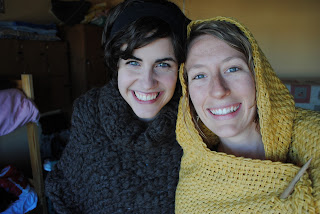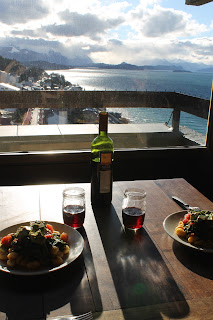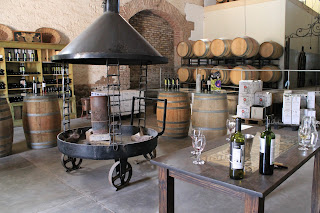The word "Patagonia" has held a mystique for me since the day I first developed an unaffordable obsession with performance clothing. In fact, my vision of Patagonia the landscape matched my attachment to the windblock, moisture-wicking baselayers made by Patagonia the company: I wanted to experience something so gorgeous and outdoorsy that I would instantly become a more hard-core, rustically attractive version of myself. I pictured myself hopping briskly up rugged cliffs, my climbing gear in my weight-efficient day pack. And now here I was, ready to board my flight to Punta Arenas, my backpack stuffed with application paraphernalia, a sorely underused copy of Spanish for Dummies, and a box of oatmeal. Ready or not, here I come, Patagonia.
We started to get a taste for the scenery to come on the plane flight, which offered us some unexpectedly clear views of the mountains and glaciers below:
After spending a couple days in Puerto Natales repacking our bags, stocking up on trail food, and (yes) sending our GRE scores to graduate schools, we boarded the bus for the Torres del Paine National Park. We were layered for warmth and hungry for adventure.
After spending a couple days in Puerto Natales repacking our bags, stocking up on trail food, and (yes) sending our GRE scores to graduate schools, we boarded the bus for the Torres del Paine National Park. We were layered for warmth and hungry for adventure.
 |
| Early morning in Puerto Natales |
 | ||
| First view of Torres del Paine
|
Our day two spirits were high from the spectacular scenery and warm weather we'd had for the Torres. We breathed a sigh of relief knowing that we had at least seen one section of the park at its best, and crossed our fingers that those photos wouldn't be the last beautiful ones we took. The day started cool and cloudy, but with patches of friendly sun and some wonderful lake views.
Toward the end of the hike, our faces started to feel the first gusts of the famously strong Torres del Paine winds. We would hear the low roar approaching from across the lake, feel the first wobbles of lost balance, and then have to find a rock or tree to cling to as the wind whipped us sideways and kicked up clouds of swirling mist over the lake.
Oh yes...it's all fun and games when you're trying not to fall on your back like a top-heavy turtle because the wind has turned your pack cover into a sail. But there were darker times to come. We arrived at Refugio los Cuernos, where we decided to set up camp so that we could have dinner indoors away from the increasingly threatening winds. Yours truly began to experience a familiar, helicopter-parent-type anxiety about my tent, and unfortunately the mischievous imp of unforeseen complications that has followed our steps so closely on this trip decided to make another appearance. The second time we went out to our site to check on the tent, just ten minutes after I had made my first paranoid inspection, the strong winds had snapped one of my tent poles and sent the broken shaft through the rain fly. Devastation. I felt like I had accidentally dropped something heavy on my puppy. We had to disentangle the tent, pack up our stuff, and hobble back to the refugio, where I instantly dissolved into tears and broken Spanish.
But in the end, karma gave us a very wonderful consolation prize. The managers of the refugio - no doubt alarmed by my crying, nose-blowing, and incorrect verb conjugations - gave us two beds inside for the price of one. What's more, they gave us an unused tent to borrow for the rest of the trip so that we could finish the hike as planned. I still spent the night mourning for my damaged tent, but we also passed an evening grateful for the incredible generosity of strangers.
The next day we set out into the extremely blustery conditions of the night before. After sweating through all our clothes on the first day, we were now hiking through blowing snow, and ended up having to pass over the French Valley section of the hike because of low visibility and even lower temperatures. But by the afternoon the skies had started to clear and we had wonderful views going into our next refugio.
That night we met up again with three Chilean chicas we'd seen at almost every step of the trail. We had found out the night before that they actually spoke excellent English and were glad to find them again at Refugio Paine Grande. We shared some chips and mini bottles of wine, made dinner together, and ended the night by singing the yodelling song from The Sound of Music. Truly, the start to a fabulous friendship.
We decided to camp the next night with them as well and in the morning packed up for Refugio Gray, which sits right by the park's biggest glacier. The hike is normally a relatively easy three and a half hours, but it ended up being a little bit more challenging with the unbelievably strong winds we met as soon as we crested the ridge and arrived at Lake Gray. We had to plant ourselves almost at 45-degree angles to make progess along the trail, and at one point almost lost my pack cover, Brianne's hat, and one of our water bottles trying to snap a photo from a windy viewpoint. But we did see some great views of the glacier and it's little hoarde of icebergs, and arrived at Refugio Gray very ready for the warmth, rest, and free hot beverages.
That night we made smores over the woodstove with our Chilean chicas, Elaine, Pamela, and Manola. We shared them with the staff at the refugio, who of course gave them the thumbs up. Who could dislike a smore? The guys then stayed and chatted for a while, sharing stories about the park and giving Brianne and I a chance to practice our "understanding, understanding, understanding, COMPLETELY LOST," Spanish comprehension game. We spent a good last night in the tent and then packed up for an early morning hike to the glacier and then back to the boat to head out of the park.
Our legs were exhausted. Our stomachs were begging for something non-rehydrated. But we were incredibly grateful for five days of no grad school, no trip planning or budget crunching, nothing to do but enjoy a place we've always dreamed of going. I may not be the outdoor warrior I thought I would be when I tackled Patagonia, but I definitely have an amateur's little-sibling love for being dirty, tired, and totally satisfied with just a few glimpses of life's beautiful places.
 |
| Happy, sleepy, and very ready for a shower |






















































